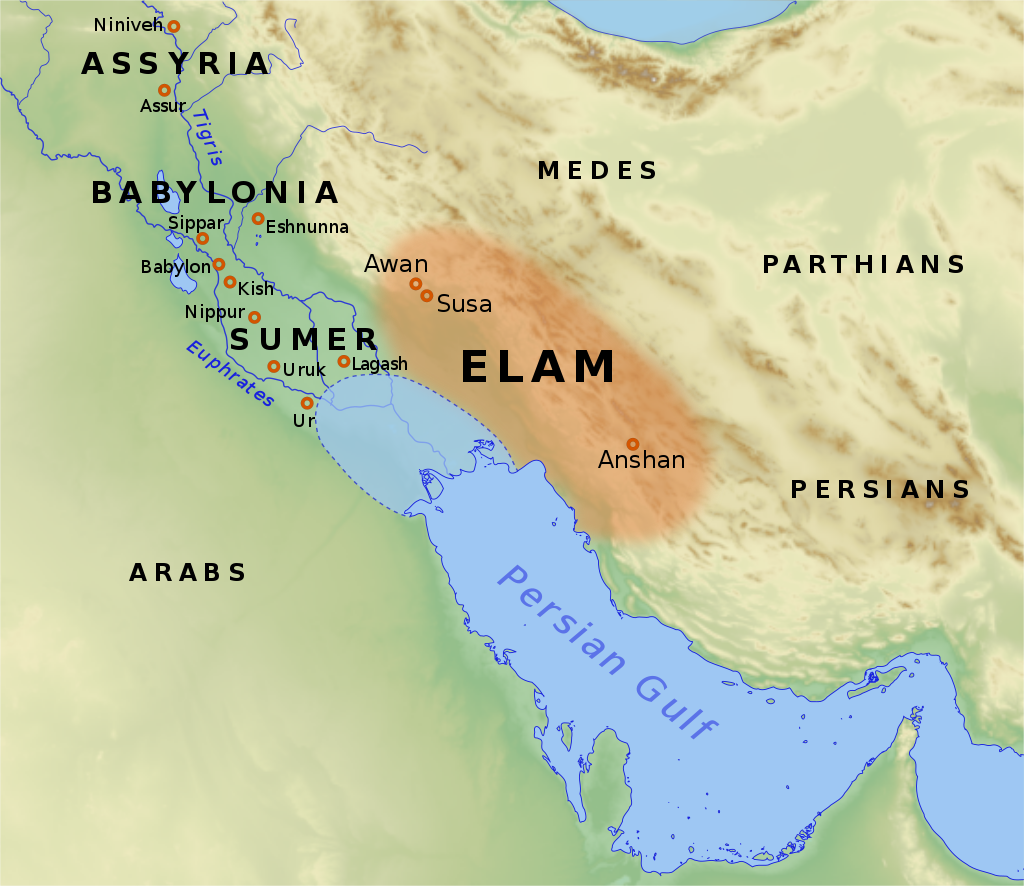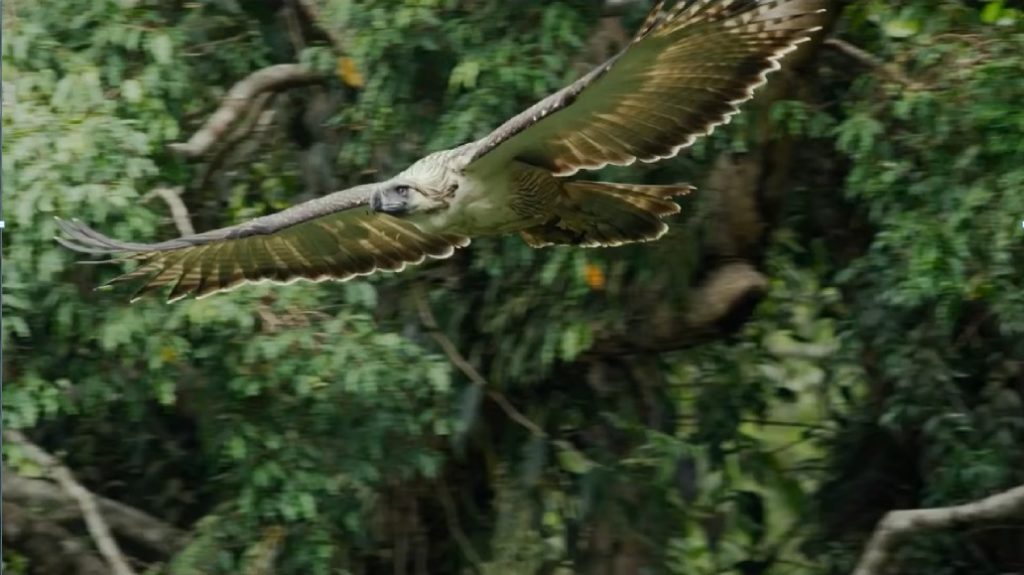

[1] Bent down is Bal, crouched down is Nabo. They were, their idol images, to the beasts and to the cattle. Your loading carriages are heavy laden, a burden to the weary.
[2] They crouched down, they bent down together. Not could they deliver the burden, and they themselves into captivity have they gone.
COMMENTARY OF YASHAI-YA’OH 46:1-2
[Verses 1-2] Bal, aka Bel, is a word from the Akkadian language meaning “lord” or “master”. This was the title of the chief god of the Babylonian pantheon whose name I will call Mardouchebag, but everyone else calls him Marduk (cuneiform: 𒀭𒀫𒌓 dAMAR.UTU). As for Nabo (cuneiform: 𒀭𒀝), aka Nebo or Nabu, this fake Babylonian god was reputed by ancient Babylonians to be the son of their fake Babylonian god Mardouchebag. The Babylonians worshiped way more than just two gods, but Mardouchebag was their primary deity and Nabo was his son. There is a reason why the prophet Yashai-Ya’oh went on the offensive against a pagan god the father and a pagan god the son, as we will see.
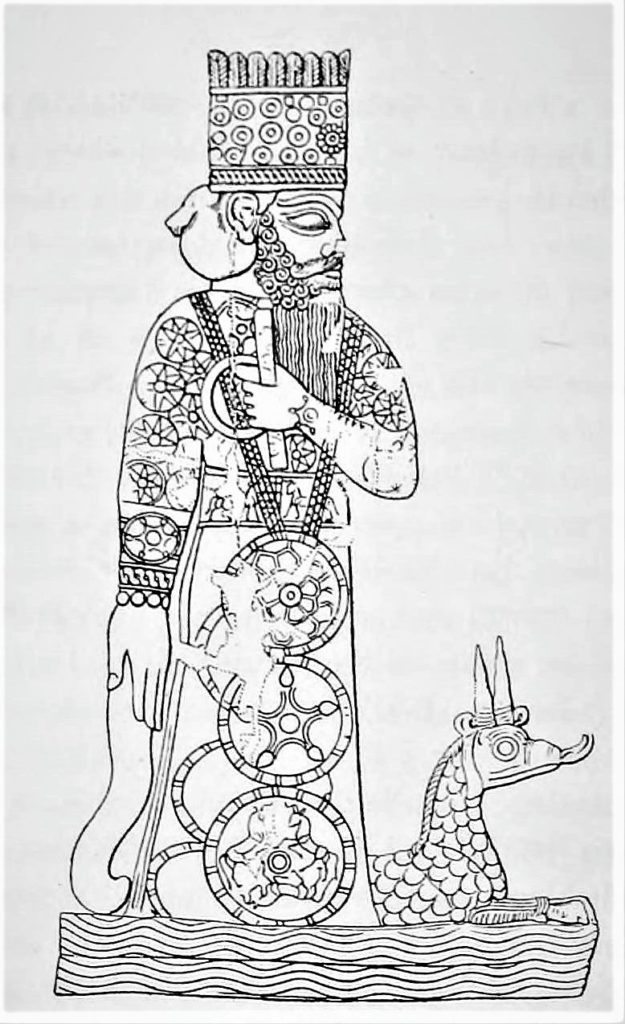
But why the disrespectful slang name calling on my part? Is this not childish? I really don’t care if it is because I am commanded not to show an ounce of respect or tolerance for the names of other gods (Thorah 2 [Exodus] 23:13). Not a single complimentary word about them, nor even a single neutral word about them, is ever allowed to be heard out of my mouth. The prophet Yashai-Ya’oh was following the same law stated in Thorah when he insulted and mocked the god Bal and his son Nabo in verses 1-2 of chapter 46. The prophet was predicting in these verses the downfall of these two idol gods and how they would be utterly helpless to stop their image statues from being loaded onto carriages on the backs of pack animals, beasts of burden, and hauled off into foreign captivity.
For the record, neither Cyrus the Great (550/547-517 BCE), nor any other king of the Persian empire, ever did what the prophet Yashai-Ya’oh predicted was going to happen to these two idol gods of Babylonia. Cyrus the Great was in fact a patron of these two gods and he protected and financed their cult shrines in Babylonia. So did every other king of Persia after Cyrus. More about this later.

[3] Hear me you all, oh House of Ya’oh-ghakab, and all the remnant of the House of Ya’oh-shar-al, the ones who carry from the belly, the ones who bear from the womb.
[4] Until old age, I am He; and until grey hair will I bear. I have made, and I will lift up, and I will carry, and I will deliver.
[5] To whom will you liken me and cause me to be equal, and you will compare me that we may be alike?
COMMENTARY OF YASHAI-YA’OH 46:3-5
[Verse 3] The word sha’arayth/שארית (remnant) in verse 3 refers to a group of survivors who have escaped a slaughter (see 2 Kings 19:4, 31). The address is not to those who had remained faithful of the eleven tribes of the Northern Kingdom taken captive by Ashor (Assyria), but to those of the captives of Ya’oh-shar-al in the prophetic Ashor, Babylon, and Matsraym in the New World who escape from that land of pyramids in the latter days. The entire nation of Ya’oh-shar-al, all 12 tribes plus Loay, was brought by ships to the Americas in order to be punished, destroyed, and slaughtered. The ones who escape the sword and make an Exodus to the second wilderness are the sha’arayth (Yaram-Ya’oh 31:1-2).
The participles ghamas and nash’ in verse 3 are repeated from verse 1, although in inverse order. The convert Jewish Masorete scribes have punctuated these two participles in verse 3 to make them passive, but as written they are active participles not passive ones. The 1611 Queen James Virus adds the word “by me” in acceptance of the very late Masoretic punctuation. Although it is true that the people of Ya’oh-shar-al have been “borne” and “carried” by their Maker from their earliest beginnings, that is not what verse 3 is saying as written. It is saying that those of Ya’oh-shar-al who escape captivity in the last days are the ones who carry from the belly, and the ones who escape captivity in the last days are the ones bear from the womb. The meaning here is that the sha’arayth, who represent the rebirth of the nation in the last days, will carry themselves from the belly and from the womb of captivity in a strange land to the wilderness in an Exodus.
The comparison being made in the source language of Yashai-Ya’oh 46:1-3 which is lost in the heathen translations is that the two idol gods in verse 1 will be borne and carried off into captivity by invaders, but the sha’arayth in verse 3 will carry and bear themselves out of captivity. They will flee and deliver themselves from out of the midst of the Babylon of the last days as predicted in multiple scriptures (Yaram-Ya’oh 51:6; Zachar-Ya’oh 2:7; May’chah 2:10).
[Verse 4] The people carry themselves out of captivity in the last days, but YA’OH is the one responsible for making it happen. Without Him, none of it would happen. The fake gods of Babylon cannot save themselves from being taken into captivity in a foreign land, but the people of the true Higher Power will save themselves from captivity in a foreign land because their Higher Power will help them do so.
Furthermore, unlike the first Exodus under Mashah in the year 3733 (i.e. 1497 BCE), the “child” that is born from the Exodus in these latter days will never be abandoned by YA’OH because it will never break the covenant with YA’OH and depart from Him like it’s ancestors did. This time around, YA’OH will remain with His people and be on their side from infancy in their rebirth as a nation until zakanah (old age) and until shaybah (grey hair), which means from the time of their escape in their Exodus from the land of the pyramids in the last days until for ever.
[Verse 5] Although the redeemed and righteous sha’arayth would never dare compare their Higher Power with someone else, most of them have to contend with members of their families who do. I am referring to OMPP who are still clinging to the abomination of desolation, which is the doctrine of the satanic Greek New Testament, a doctrine that makes the idol god Jeebus Christ out to be an equal co-creator alongside the Almighty Father. The sha’arayth must shred themselves of all traces of this satanic religious worldview which is the dominant religion in the land of the pyramids where their ancestors were brought by ships across the Middle Passage during the transatlantic slave trade.

[6] The ones who make cheap the gold from a bag, and money upon a balance will they weigh out. They will hire a smelter, and they will make it a god. They will prostrate, yes indeed they will worship.
[7] They will bear it up upon the shoulder. They will carry him, and they will set it in its place, and it will stand up. From its place it will not be removed. Yes indeed, one will cry out to it, and it will not answer. From his distress it will not save him.
COMMENTARY OF YASHAI-YA’OH 46:6-7
[Verse 6] The word zol/זול means to cheapen not to lavish. Hence the pluralized active participle zalaym/זלים in verse 6 means the “ones who make cheap”. This is significant because the famous golden statues of Jeebus seen around the world are not made and lavished with real gold. Of course they are not. The materials and the metals used are cheap imitations made to look like real gold. The makers have not gone all out and spared no expense. Instead, they have weighed out the money on a balance and have cut costs in order to make these idols! The image statue of Bal-Mardouchebag, on the other hand, was gilded with real gold. Mardouchebag’s image of gold was housed in the city of Babylon’s main temple, the Esagila. The image statue of the Mardouchebag’s son Nabo, also gilded with real gold, was housed in the temple of Ezida in the Babylonian city of Borsippa. At least the ancient Babylonians honored their false gods enough to use real gold in making their statues, but the modern-day “Babylonians” in the land of the pyramids the New World, and elsewhere, make their idols with inexpensive materials and fake gold.
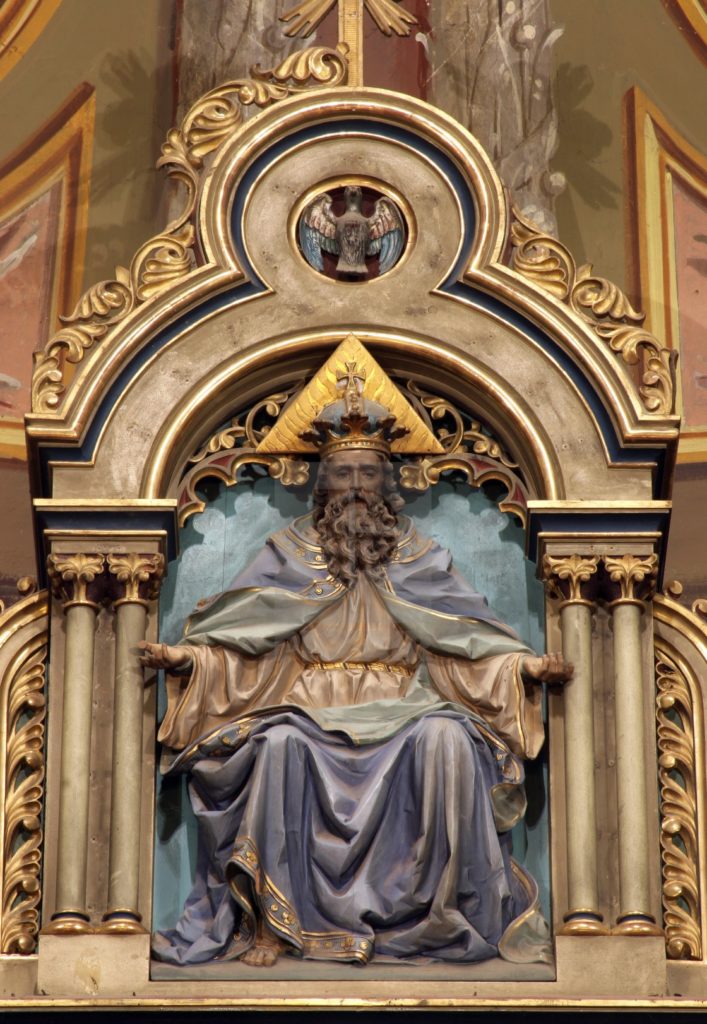
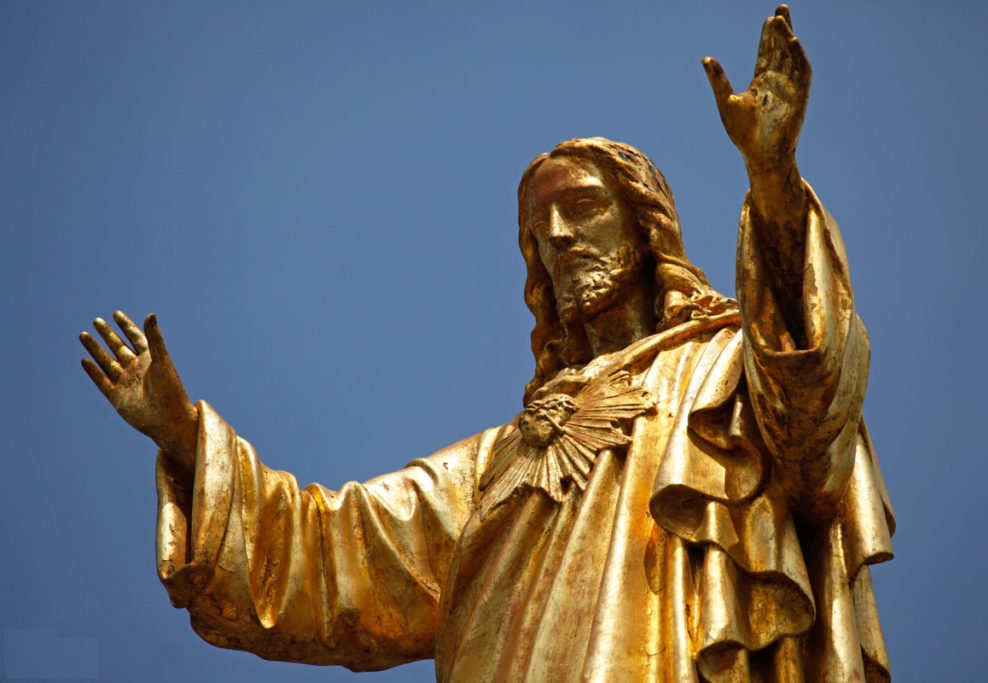
[Verse 7] This verse contains very important information. The prophet was mocking Mardouchebag (i.e. god the father), and Nabo (i.e. god the son), but that’s not all he was doing. The image statues of these two gods were moved around from place to place during the annual parade of the statues through the land of Babylonia at the time of the New Year’s festival. The image statue of Mardouchebag was also forcibly moved and taken into captivity on a number of occasions centuries prior to the time of the prophet Yashai-Ya’oh in the 8th century BCE. Notice carefully, however, that the idols mentioned in verses 6-7 do not move from place to place once they are set up. I repeat, the prophet says they don’t move. This is what the question asked in verse 5 is about. The transgressors of Ya’oh-shar-al will be those OMPP who compare and liken the true Higher Power to the fake god Mardouchebag, but not the Mardouchebag of old whose statue moved around.
In other words, the prophet Yashai-Ya’oh foresaw the cheaply made and non-moveable idol gods of the future that his people would be worshiping. He was not only talking about the very costly made and portable Babylonian idol gods of the past. The Babylonian gods Mardouchebag and his son Nabo correspond to satanic Christianity’s god the father and his co-equal god the son. Unbeknownst to most, the father and son of ancient Babylonian religion have been revisited. They have reappeared with new names in the form of the father and the son of Christianity, but in their new lives the image statues of these gods made by smelters don’t move around. They are immoveable, and they are made of cheap material!
So, since I am mocking Mardouchebag (Marduk) and his son, I would be remiss if I did not also mock their reincarnations, Jehovah (his other names are Yehovah, Yahawah, Yahuah, Ahayah) and his son. The gods Jehovah (Yehovah, Yahawah, Yahuah, Ahayah) and his son are douchebags since they are Christianity’s remix of Babylonian gods, a god who has an only begotten god as his son, who I call Jeebus (Jesus), who died as a blood sacrifice for sins. That god and his son are abominations, figments of satanic Christian imagination. The one true Higher Power, whose name is YA’OH, does not have an only begotten son who died as a blood atonement sacrifice on behalf of people’s sins. For the past 500 years OMPP have been brainwashed to pray to and cry out to the gods of their oppressors and captors for help, and no help in the land of the pyramids has ever come from them. The plight of our people has not improved by help coming from these stupid ass gods.

[8] Remember this and be deeply ashamed! Cause to bring, oh you transgressors, upon the heart.
[9] Remember the former things from old, for I am the Higher Power, and there is none else! The Higher Power, and nothing is like me.
[10] The one declaring from the beginning the end, and from ancient times that which will not be done. The one saying my counsel will stand, and all my pleasure will I do.
COMMENTARY OF YASHAI-YA’OH 46:8-10
[Verse 8] We are ordered to remember just how useless these gods have been to us and to be deeply ashamed for worshiping them. This means finally putting away the religious beliefs given to us by our oppressors because YA’OH was punishing us and using our oppressors to do it by forcing us to embrace this utterly useless religion. The sinners of our people have to bring this to heart and reflect deeply over it or they will never see the truth.
[Verse 9] We are ordered to remember even more remote times when our ancestors knew that there is no other Higher Power besides YA’OH. There is nothing and no one like Him. Jehovah and his son Jeebus are the false gods of wood and stone that YA’OH said He would make us worship in a strange land (Thorah 5.28:64), and now that we know that we’ve been punished, and why, these gods of wood and stone must be thrown into the trash where they belong.
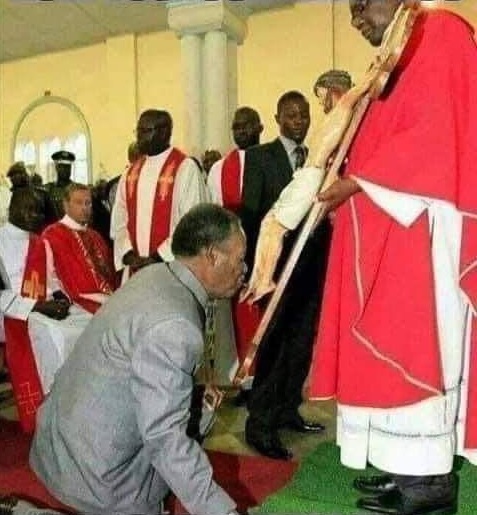
[Verse 10] YA’OH alone is the one who declares from the beginning what the end will be and what it will not be. No other so-called god is able to do this, and this is how He proves Himself.
The one saying my counsel will stand, and all my pleasure will I do. Take special notice of the word ghatsah/עצה (counsel) in this verse because it will appear again in verse 11 and the meaning is the same. What is the ghatsah of YA’OH that will stand if not His laws, His statutes, and His commandments kept by His people when they reach the end of their punishments and curses and a remnant returns to Him with their whole heart (Mashlay [Proverbs] 19:21)? In Mazmor (Psalm) 107:11 the people of Ya’oh-shar-al are rebuked for rejecting the ghatsah of YA’OH, and this is obviously referring to breaking the covenant that He made with their fathers and with their seed.
No other power can frustrate, disappoint, or manipulate His purposes and His predictions. This is another argument urged for the supremacy of the Higher Power of Ya’oh-shar-al, namely, His foreknowledge and prediction of future events, of which the prophet Yashai-Ya’oh subjoins a particular instance of in the words of the following verse 11.

[11] The one calling from the east the ravenous bird, from a land far away, the man of my counsel: Yes indeed, I have said it. Yes indeed, I will bring it. I have fashioned. Yes indeed, I will do it.
[12] Listen to me, you ones stout of heart, ones far from righteousness.
[13] I have brought near my righteousness. It will not be far off. My salvation will not be delayed, and I will put in Tsayon salvation for Ya’oh-shar-al my glory.
COMMENTARY OF YASHAI-YA’OH 46:11-13
[Verse 11] There can be no doubt that the people reading this verse and telling you it is talking about the Patriarch Abrahm, or that it is talking about Cyrus the Great of Persia, or that it is talking about Jeebus Christ, are not reading this text in its context, nor are they taking the source language into account at all. So let’s systematically debunk each of these views.
Is the Patriach Abrahm the ravenous bird? No. The ravenous bird is a man who had not appeared yet when the prophet Yashai-Ya’oh wrote his book in the 8th century BCE and prophesied his coming. This verse explicitly says the ravenous bird is someone YA’OH will bring and that he is something YA’OH will do. The future tense verbs in this verse preceded by the emphatic affirmation particle ap/אף (yes indeed) cannot be passed over and ignored. The ravenous bird cannot possibly be the Patriarch Abrahm because Abrahm lived and died many centuries earlier than the time of the prophet Yashai-Ya’oh.
What about Cyrus the Great? No. Cyrus was a man of the future with respect to the prophet Yashai-Ya’oh’s time, but according to the chronology laid out by the prophet in this chapter the captivity of the image statues of the gods Mardouchebag and his bastard son Nabo mentioned in verses 1-2 has to precede the coming of the ravenous bird mentioned in verse 11. When were these image statues taken from their temples in ancient Babylonia and dragged off into foreign captivity by invaders? We know it didn’t happen at any point during the periods of the Neo-Babylonian and Persian empires, and this means the ravenous bird cannot be any king of Persia during the entire Persian period (539-330 BCE).
Moreover, the ravenous bird cannot be Cyrus the Great because Cyrus the Great worshiped these two gods and protected them the entire time he controlled Babylon from 539 BCE until his death in 517 BCE. In one inscription from the temple of Eanna in Uruk, Cyrus the Great calls himself “the caretaker of the temples of Esagila and Ezida”. These were the sanctuaries of the two gods Mardouchebag in Babylon and his bastard son Nabo in Borsippa.[1]
We also know the captivity of these image statues did not happen prior to the time of Alexander the Great (336-323 BCE) because Alexander is mentioned in an astronomical diary from 325 BCE which records that he restored the horned crown of Mardouchebag’s statue in the Esagila. This means the statue was there in the Esagila in the time of Alexander the Great.[2] An even later reference from the period of Parthian rule in Mesopotamia (247 BCE to 224 CE) shows that the Characenean/Iranian ruler Hyspaosines (141–124 BCE) gave gifts to the image statue of Mardouchebag when he became king of Babylon in 127 BCE.[3]
Since the statue was a known historical object as late as the time of Parthian rule beyond Hyspaosines’s time, and since the Sassanids did not destroy the city of Babylon when they invaded in 224 CE and took Babylon away from the Parthians, the only logical conclusion is that the image statues of Mardouchebag and Nabo were not carried off into captivity until the Muslim conquest terminated Sassanid rule in 651 CE. The city of Babylon was inhabited by man and by animal up until the mid-7th century CE. The Muslim conquest is what finally brought the city of Babylon to an end. The city became ruins and a source of bricks used to build cities from Baghdad to Basra. It’s life was finally over and it has never been inhabited by man or by animal ever since. All of this had to happen before the ravenous bird appears. He cannot come onto the scene until after an invasion eliminates the idol statues from Babylon and that invasion was the Muslim conquest.
What about Jeebus Christ? Is he the ravenous bird? No. As we have seen, the Muslim conquest in the 7th century CE which ended Babylon precedes the coming of the ravenous bird. So the ravenous bird cannot be the fictional character Jeebus Christ who the whole world has been deceived into believing that he died on a cross for man’s sins in the 1st century CE.
I have also demonstrated that Yashai-Ya’oh prophesied the remix of the old Babylonian religion centered around Mardouchebag and his bastard son Nabo in verses 6-7. They became Christianity’s God the father and God the son whose inexpensive statues made by smelters do not move from their places. The ravenous bird does not come until after this new religion has been embraced by the children of Ya’oh-shar-al brought by ships to the land of pyramids in the New World where this remix of Babylonian religion is the dominant religion. The curse of the transatlantic slave trade prophesied by Mashah in Thorah 5.28:68 did not begin until the 16th century CE. That means the ravenous bird does not come onto the scene until after the 16th century CE.
The key to understanding how to recognize the ravenous bird has been given by the prophet in verses 10-11. He is a man who will do the ghatsah (counsel) of YA’OH in a far off land in the east. This is the far east where the sun rises, the same place where another scripture says that the man YA’OH will send (to execute His ghatsah) will be a man from the north who will proclaim the true name of the Higher Power from the far east (Yashai-Ya’oh 41:25). The place in the east where the ravenous bird operates is further identified as a group of islands at the end of earth (Yashai-Ya’oh 24:15-16; 41:1, 25). When the sun is seen rising in the east from the location of the holy land the sun is actually over the Philippine islands in the far east. Neither Abrahm, nor Cyrus the Great, nor Jeebus Christ were in the Philippine in the far east where the sun rises.
The eagle that will be on the scene and spreading his wings when Adom is to be destroyed by the people of Ya’oh-shar-al (Yaram-Ya’oh 49:22; Ya’oh-khazak-al 25:14) is the same man that Yashai-Ya’oh 46:11 is talking about. The reason he is called ghayt/עיט (ravenous bird) is because his character and his methods when dealing with his adversaries will remind one of an eagle’s behavior in the wild, i.e. swift, offensive, combative, aggressive, violent, ruthless, and foul. These are all qualities which Judeo-Christianity has misled the world into believing a man of God should not possess. I don’t know what else to tell you except that YA’OH, the one calling the ravenous bird from the east, does not agree.
For YA’OH not only foretells before the appearance of the ravenous bird, whose nickname is Chorash (Yashai-Ya’oh 45:4), what is to be expected of him, He also declares that His determination must be realized, that He will bring to pass everything upon which His will is fixed, and He summons forth the man upon the stage of history as the instrument of its accomplishment, so that He knew the ravenous bird and nicknamed him Chorash before he himself had either consciousness or being (Yashai-Ya’oh 45:5). The distant and far away land in the east is the Philippine islands (Yashai-Ya’oh 41:2); and the land of the north (Yashai-Ya’oh 41:25) where the ravenous bird comes from is North America.[4]
Lastly, the ravenous bird must be a man of Ya’oh-shar-al descent who was born in captivity in the land of the pyramids, for YA’OH does not raise up prophets and anointed ones from other nations since the day He took Ya’oh-ghakab (Jacob) to be His peculiar people in the first Exodus (Mazmor 147:19-20). He is the man of my counsel because he is tasked with raising up the sha’arayth, leading their Exodus from the land of the pyramids to the second wilderness, and then the destruction of their oppressors, particularly the modern-day Babylon (i.e. the United States of America) where Mardouchebag and Nabo are the main gods worshiped under the guise of Christianity’s God the Father and God the Son.
[Verse 12] Listen to me, you ones stout of heart, ones far from righteousness. He means listen carefully to what He just said, because if OMPP do not pay careful attention, if they cannot tell time correctly, they will confuse and mistake the ravenous bird when he comes for a foul and unrighteous man, when in fact his detractors and his enemies will be the ones stout of heart and far from righteousness. Looks and appearances can be deceiving. Always reserve judgment and look deeper.
[Verse 13] This verse is linked to the previous verses 11 and 12. The coming of the ravenous bird is when YA’OH brings righteousness near. It is when salvation will come from YA’OH to the sha’arayth of Tsayon (Zion) who have escaped from the sword in the land of pyramids in the New World and have congregated in the second wilderness (Yaram-Ya’oh 31:1-2). Failure on the part of OMPP to tell time correctly and to recognize these events when they happen – and they are happening now – will result in them being excluded from the harvest and left behind with the locusts.
The one Above All will be glorified in those few OMPP He chooses to be part of the sha’arayth, the ones who will call upon His true name (Ya’oh-al [Joel] 2:32), the name that is now being proclaimed and reintroduced by the ravenous bird in the east. Those who are not part of the sha’arayth will share in the fate of the locusts who brought their ancestors to the shores of the Americas by slave ships. Everything rests upon His name.
His name is YA’OH
Always has been. Always will be.
#EXODUS2023
1.15.7252 (April 5, 2023)
END NOTES
[1] Schott, A. (1930). “Die inschriftlichen Quellen zur Geschichte Eannas,” APAW (Phil.-hist. Kl., 7), page 63, no. 31.
[2] Sachs, A.J. and H. Hunger (1988). Astronomical Diaries and Related Texts from Babylonia. Vol. 1: Diaries from 261 B.C. to 165 B.C. (Wien: VOAW), no. -324.
[3] van der Spek, R. J. (2001). “The Theatre of Babylon in Cuneiform”. Veenhof Anniversary Volume: Studies Presented to Klaas R. Veenhof on the Occasion of His Sixty-fifth Birthday: pages 445–456.
[4] Cyrus the Great was not from a northern land. He was from Anshan in the southern part of Elam. Elam was south-east of the promised land in the Levant.
